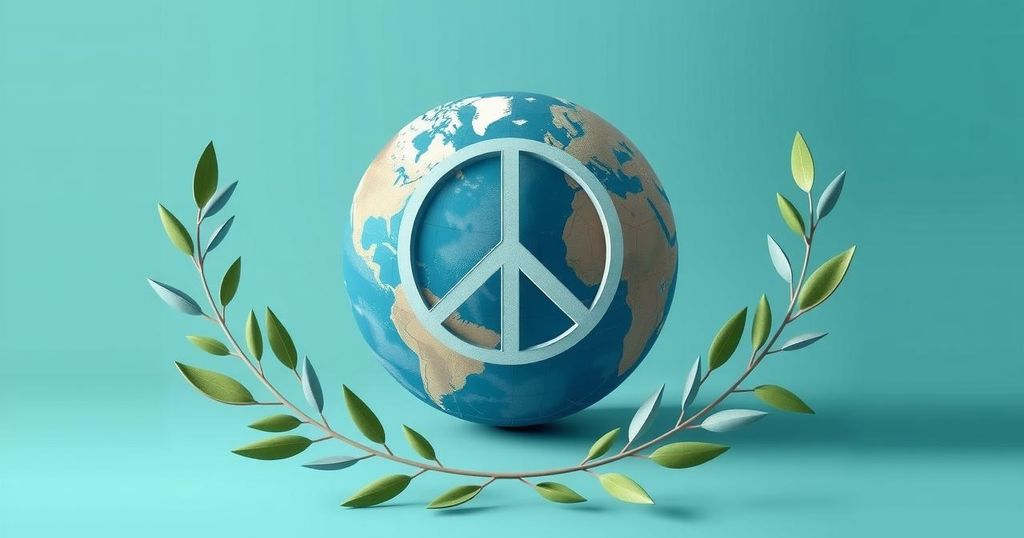World news
ABC NEWS, ASIA, DONALD TRUMP, EUROPE, EUROPE/ASIA, GEOPOLITICS, HOUSE, MILITARY, MILITARY SUPPORT, NATO, NORTH AMERICA, ODESSA, PUTIN, RAND THINK TANK, RUSSIA, RUSSIA-UKRAINE WAR, RUSSIAN INVASION OF UKRAINE, SAUDI ARABIA, TRUMP, UKRAINE, UNITED STATES, WAR, ZE
Marisol Gonzalez
0 Comments
Overview of Indirect Ceasefire Talks Between Russia and Ukraine in Saudi Arabia
Both Russia and Ukraine will engage in indirect ceasefire talks in Saudi Arabia, illustrating the ongoing divide between the nations. Putin has proposed limited ceasefire terms focused on energy, while Zelensky seeks a comprehensive agreement. Accusations of violations have already surfaced, and the involvement of international mediators underscores the complexity of the situation amidst ongoing military actions.
Negotiators from Russia and Ukraine are set to engage in indirect ceasefire talks in Saudi Arabia on Monday, emphasizing their ongoing separation despite claims from the White House that peace is within reach. Keith Kellogg, former special envoy for Ukraine and Russia, remarked that the negotiations would resemble “proximity discussions… sort of like shuttle diplomacy in a hotel.”
Ukraine has expressed its willingness to pursue a comprehensive ceasefire without preconditions. In contrast, President Putin has only proposed a limited ceasefire that involves halting attacks on energy infrastructures, an approach that seemingly benefits Russia given its historical targeting of Ukraine’s power systems during winter. Meanwhile, Ukraine has countered with strikes against Russian oil facilities to disrupt its fuel supply.
President Trump announced on social media that there was a mutual understanding to expedite the process toward a complete ceasefire. However, Moscow has yet to show flexibility on significant issues, such as ceasing Western support for Ukraine and halting NATO aspirations. President Zelensky has urged Putin to stop making excessive demands that only serve to prolong the conflict.
The enforcement of a broader ceasefire remains uncertain, particularly as Russia has rejected any involvement of NATO-backed peacekeeping forces. Samuel Charap, a Russia analyst, noted that ceasefires are often fragile and can quickly devolve, suggesting that developments may often appear as “one step forward, two steps back.”
On Friday, Russia and Ukraine exchanged accusations regarding violations of the partial ceasefire. Russia alleged that Ukraine detonated a gas station in a town it had previously occupied. During this, Moscow launched drone strikes on Odessa, wounding civilians and damaging properties, prompting Ukraine’s response condemning the attacks on civilian sites.
President Zelensky indicated that his office was compiling a list delineating civilian infrastructure exempt from strikes, including transportation systems and ports. Andrey Stavnitser, CEO of TIS port, expressed skepticism towards agreements with Russia, recalling previous sabotage during talks and underscoring the necessity of international observers on the ground to ensure compliance.
Russia’s call for a naval truce in the Black Sea arises from Ukraine’s effective blockade of much of the Russian fleet. According to political scientist Kirill Rogov, agreeing to a partial ceasefire benefits Putin, given his current lack of advantages in that region. The discussions in Saudi Arabia will also address the complex issue of grain shipments through the Black Sea, especially considering previous disruptions stemming from mutual accusations during earlier agreements.
The talks will feature leading figures from Russia and Ukraine; Grigory Karasin and Sergey Beseda will represent Russia, while Ukraine will send Defense Minister Rustem Umerov and advisor Pavlo Palisa. American mediators, including Michael Anton from the State Department, will also participate, navigating the nuances of potential U.S. influence over the situation.
Despite sanctions imposed after the invasion, Russia continues its military efforts, raising questions about Washington’s leverage over Moscow. Indeed, the U.S. has exercised caution in restricting Russian energy exports to avoid global market disruptions. The eventual success of sanctions hinges on punitive measures against entities assisting Russia’s evasion efforts, although officials have floated the idea that some sanctions relief may accompany a broader peace deal.
Russia demands the cessation of U.S. intelligence sharing with Ukraine, a critical component of Ukraine’s defense capabilities. Although U.S. sharing resumed after Zelensky advocated for a full ceasefire, Putin later rejected this. In the meantime, Europe’s efforts to secure a negotiating role are challenged by its relations with Washington and the ongoing conflict.
The European Commission has laid out plans to allocate approximately $870 million over four years to enhance European defense, stressing the importance of actionable strategies and funding to support Ukraine. Maria Snegovaya, a specialist on Russia, highlighted the necessity for Europe to devise practical suggestions and provide financial support for weapon purchases from the U.S.
In conclusion, the upcoming indirect ceasefire talks in Saudi Arabia between Russia and Ukraine underline the persistent challenges each side faces despite being presented as a potential avenue for peace. Observers remain skeptical, particularly in light of Russia’s limited concessions and Ukraine’s concerns over security guarantees. The involvement of U.S. mediators and European allies is essential for navigating the complexities of the negotiations, especially given the stakes surrounding intelligence sharing and military logistics. As both parties enter this delicate phase, the potential for misunderstandings and escalations remains high, necessitating close attention from international stakeholders.
Original Source: www.washingtonpost.com




Post Comment